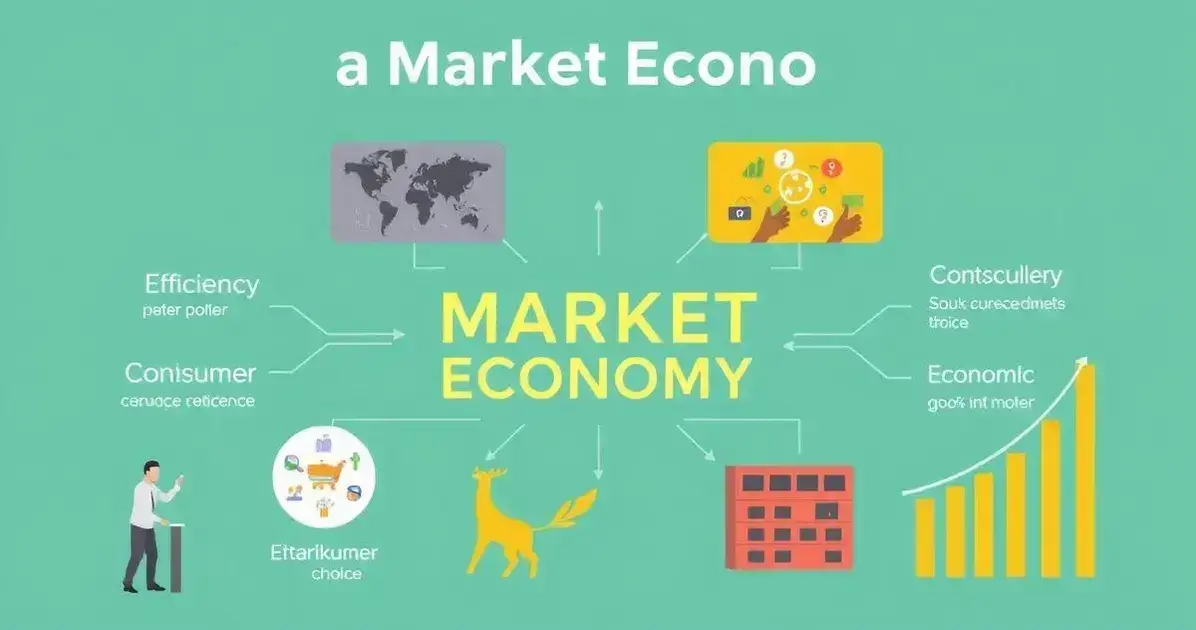Announcements
Market economy is the engine behind everyday financial decisions. It runs on supply and demand, giving businesses and consumers the power to shape markets. Unlike controlled economies, it operates with minimal government interference.
This system thrives on competition. Companies innovate, prices adjust, and industries evolve based on consumer choices. The result? More variety, better quality, and constant economic growth.
But what makes a market economy so effective? And what challenges does it face? Keep reading to find out.
Announcements
Understanding Market Economy
A market economy is a system where the prices of goods and services are determined by supply and demand. This economic model allows individuals and businesses to make choices based on their preferences and needs. Unlike a planned economy, where decisions are made by a central authority, a market economy thrives on competition and voluntary exchanges.
How Does a Market Economy Work?
In a market economy, producers and consumers interact to create a dynamic environment. When consumers want more of a product, prices typically rise, encouraging producers to supply more. Conversely, if a product is less popular, prices can fall, leading producers to supply less. This cycle of supply and demand regulates the market.
Announcements
Characteristics of Market Economies
Market economies have several key characteristics:
- Private Property: Individuals can own land and businesses.
- Competition: Multiple businesses can enter the market, leading to variety and innovation.
- Freedom of Choice: Consumers can choose what to buy and producers can choose what to sell.
These features empower both consumers and producers, facilitating local and global trade.
Role of Government
While market economies are primarily driven by individual choices, the government plays a role too. It regulates markets to prevent monopolies and protect the environment and consumers. This balance helps maintain fairness and competition.
Importance of Market Economy
Understanding how a market economy functions is crucial for grasping global economics. It influences everything from job creation to technological advancements, making it essential for everyone to learn about this system. This knowledge allows consumers to make informed decisions while helping businesses to thrive.
Key Features of a Market Economy
The key features of a market economy give shape to how it functions. These features work together to promote efficiency, innovation, and consumer choice.
1. Private Property Rights
In a market economy, individuals have the right to own and control property. This encourages people to invest in businesses, knowing they can benefit from their profits.
2. Freedom of Choice
Consumers and producers are free to make their own choices. Consumers can select products that meet their needs, while producers decide what to create based on market demand.
3. Competition
Competition is a hallmark of market economies. It encourages businesses to improve their products and services, leading to innovations that benefit everyone.
4. Efficient Resource Allocation
Market economies allocate resources where they are most needed. Prices reflect the demand for goods and services, guiding producers to areas of high demand.
5. Limited Government Intervention
While governments may regulate markets to promote fair practices, they do not control them. This hands-off approach allows the market to self-correct and adapt to changing conditions.
Benefits of a Market Economy

There are many benefits of a market economy that contribute to its appeal and effectiveness. These advantages support both consumers and producers in various ways.
1. Increased Efficiency
Market economies encourage efficiency in production. Businesses strive to minimize costs and maximize outputs to stay competitive. This leads to more efficient use of resources.
2. Innovation and Variety
Competition drives innovation, resulting in new products and services. Consumers enjoy a wider selection, ensuring that their diverse needs are met. This also encourages businesses to improve their offerings continuously.
3. Consumer Sovereignty
In a market economy, consumers have the power to influence what gets produced. Their choices shape the market, guiding businesses to cater to consumer preferences.
4. Economic Growth
By promoting entrepreneurship and investment, market economies often experience faster economic growth. This growth can lead to job creation and improved living standards for many.
5. Flexibility and Adaptability
Markets can adjust quickly to economic changes, such as shifting consumer preferences or resource availability. This adaptability helps maintain a balance in supply and demand, ensuring continued economic health.
Challenges in a Market Economy
Despite its advantages, a market economy faces several challenges that can impact its effectiveness. Understanding these challenges is essential for navigating this economic system.
1. Economic Inequality
In a market economy, wealth can become concentrated in the hands of a few. This can lead to significant economic inequality, where a small portion of the population holds most of the resources.
2. Market Failures
Not all markets function perfectly. Market failures occur when there is a lack of competition or when externalities, like pollution, are not addressed. Such failures can harm the economy and society.
3. Unemployment
While a market economy promotes job creation, it can also lead to unemployment during economic downturns. Businesses may cut jobs to reduce costs, leaving workers without work.
4. Short-term Focus
Businesses may prioritize short-term profits over long-term sustainability. This focus can lead to overexploitation of resources, potentially harming the environment and future growth.
5. Consumer Protection Issues
In a competitive market, businesses may cut corners to reduce costs. This can raise concerns regarding the safety and quality of products, making consumer protection essential.
Future of Market Economies
The future of market economies is shaped by various trends and innovations that could redefine how they function. Understanding these factors is crucial for adapting to changes.
1. Globalization
Market economies are becoming more interconnected due to globalization. This means that goods, services, and labor can move across borders more freely, creating new opportunities and challenges for local businesses.
2. Technological Advancements
Technology is transforming market economies. Automation, artificial intelligence, and e-commerce are changing how businesses operate. This can lead to increased efficiency but also raises concerns about job displacement.
3. Sustainability Focus
As awareness of environmental issues grows, market economies are likely to place more emphasis on sustainability. Consumers are demanding eco-friendly products, pushing businesses to adapt their practices.
4. Shifts in Consumer Behavior
Consumers are increasingly informed and demand transparency from businesses. This shift is influencing how companies market products and engage with their audience, promoting more ethical practices.
5. Government Policies
The role of government will continue to be important in shaping market economies. Regulations aiming to protect consumers, promote fair competition, and address economic inequality will likely evolve.
FAQ – Frequently Asked Questions about Market Economy
What is a market economy?
A market economy is a system where the prices of goods and services are determined by supply and demand, allowing consumers and producers to make their own choices.
What are the key features of a market economy?
Key features include private property rights, competition, freedom of choice, efficient resource allocation, and limited government intervention.
What benefits does a market economy provide?
Market economies promote efficiency, innovation, consumer sovereignty, economic growth, and flexibility, allowing them to adapt to changes quickly.
What challenges do market economies face?
Challenges include economic inequality, market failures, unemployment, short-term focus of businesses, and consumer protection issues.
How might market economies evolve in the future?
Future market economies may be shaped by globalization, technological advancements, a focus on sustainability, shifts in consumer behavior, and government policies.
How does globalization impact market economies?
Globalization increases interconnectivity, allowing goods, services, and labor to move across borders easily, creating new opportunities and challenges for businesses.







